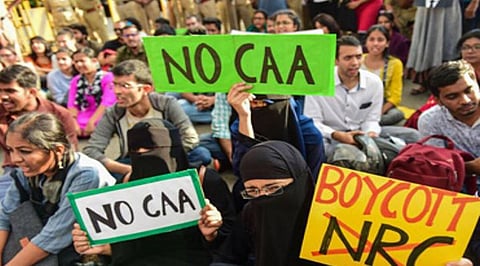

A division bench of the Supreme Court comprising Chief Justice of India U.U. Lalit and Justice S. Ravindra Bhat is scheduled to hear the petitions challenging the Citizenship (Amendment) Act, 2019 on Monday.
—–
THE Citizenship (Amendment) Act, 2019 ('CAA') is an amendment to the Citizenship Act, 1955 and was enacted on December 12, 2019. It makes persons "belonging to Hindus, Sikhs, Buddhists, Jains, Parsis and Christians community from Afghanistan, Bangladesh or Pakistan, who entered into India on or before the 31st day of December, 2014" to, on the fulfilment of certain criteria, eligible to apply for Indian citizenship by registration or by naturalisation.
The CAA also seeks to relax the requirement of residence in India for citizenship through naturalization from the current norm of eleven years for persons staying in India legally to five years for the aforesaid category of persons.
“The purported intelligible differentia sought to be made in the CAA, that is, religion and country of origin, have no nexus with the object sought to be achieved, that is, reprieve from persecution for the minority communities in the specified countries.
Thus, the CAA enunciates two classifications:
“The evolution of cultural and ethnolinguistic identity takes millennia and serves as a historical reservoir that provides people with feelings of belonging and security, shared values and aspirations and contributes to their wellbeing. It is an inextricable part of an individual, and is necessary for them to live a wholesome life, thus constituting a sine qua non for a life with dignity.
What are the grounds of unconstitutionality?
Though there are several constitutional infirmities in the proposed NRC exercise itself, when it combines with the CAA, it directly and inevitably puts mainly the Muslim citizens of India at the risk of losing citizenship. Hence, the same is discriminatory and falls foul of both Article 14 and the basic feature of secularism enshrined in the Constitution of India.
“The resolution to the illegal immigration and refugee crisis does not lie in providing citizenship on the discriminatory ground of religion and country of origin, but through diplomacy as well as by devising a holistic asylum policy based on the Constitutional guarantees of equality, fairness and due process of law, and on international norms.
The combined operation of the CAA and the NRC, and the consequential deprivation of citizenship, directly and inevitably affects a catena of fundamental and other rights enshrined in the Constitution of India since citizenship is a gateway to a multitude of rights. Since the potential NRC exercise would be pervasive and affect the whole of the population of India, such an impact on fundamental and other rights shall be potentially widespread, thus further making the process suspect in the eyes of the Constitution.
The resolution to the illegal immigration and refugee crisis does not lie in providing citizenship on the discriminatory ground of religion and country of origin, but through diplomacy as well as by devising a holistic asylum policy based on the Constitutional guarantees of equality, fairness and due process of law, and on the international norms enshrined in the International Covenant on Civil and Political Rights, the Convention Relating to the Status of Refugees, and the International Convention on the Elimination of All Forms of Racial Discrimination. An appropriate legal framework should be devised to process requests for refugee status and citizenship, and to ascertain the rights and obligations flowing from such status.
Needless to say, any such policy must take into account the balance between the rights of the citizens, and the need to provide an effective system for the protection of refugees and asylum seekers.